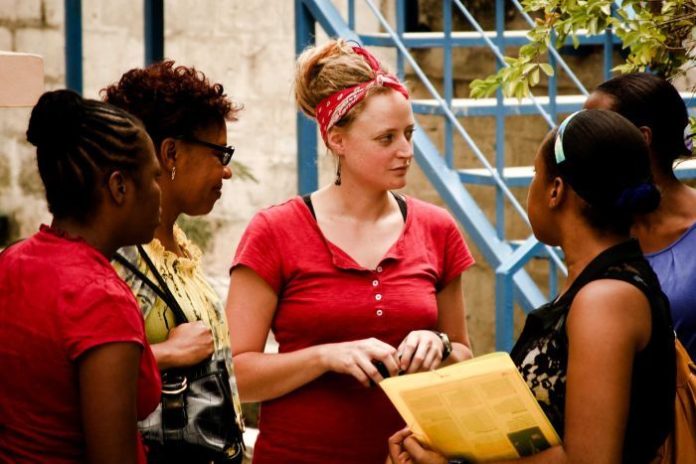
A 15-year-old girl is raped by two strangers on her way to the market in Port-au-Prince, the capital of the Caribbean country of Haiti.
She makes it home and the distressed teenager tells her family what happened.
Her father says she has disgraced herself and the family, then he beats her and kicks her out of home.
She ends up at a new sexual violence clinic in Port-au-Prince, set up by Médecins Sans Frontières (Doctors Without Borders).
We were also able to keep her with us for a few days and we worked together with her and our social worker and psychologist.
Tasmanian doctor Lisa Searle
Tasmanian doctor Lisa Searle was just 15 herself when she decided she wanted to work for the humanitarian medical aid organisation.
Dr Searle said the young Haitian girl’s case had stuck with her from her four months spent establishing the clinic.
“Her father became very angry at her, blamed her for being attacked, said that she was out at the wrong time in the wrong street, and basically said that she was now not marriageable and that he would no longer have her living in his house,” she said.
“So she luckily managed to make it to our clinic and she was in a very distressed state when she got to us, she was upset, she had nowhere else to go.”
The clinic helped her to prevent pregnancy and sexually transmitted infections, including HIV.
“We were also able to keep her with us for a few days and we worked together with her and our social worker and psychologist,” she said.
“We got her family to come in and we had some supervised sessions between her and her father to understand what his concerns were, why he had reacted like that, help him understand what had happened to her and that it wasn’t her fault.”
The pair reconciled and the girl returned home.
Sexual violence ‘greatly increased’ since earthquake
In the years since the catastrophic earthquake that hit Haiti in January 2010, the problem of sexual violence has increased.
“In any case of disaster, whether it be conflict or natural disaster, and whenever there’s a big group of displaced people we tend to see a big increase in the rate of sexual violence,” Dr Searle said.
The crimes are committed both by strangers and people known to the victim.
About a third of the victims are under 18 and some are as young as 12.
“Following the earthquake there were a lot of displaced people in internally displaced person camps around Haiti and there was a greatly increased number of sexual violence cases happening,” she said.
I knew from about when I was 15 that I wanted to work with Médecins Sans Frontières and that was one of the reasons I decided to study medicine
Médecins Sans Frontières doctor Lisa Searle
“And at the same time most of the existing services in Haiti were destroyed by the earthquake so it was quite difficult for people who’d been victims of sexual violence to access help.”
Despite five years passing, most of the services have not been rebuilt.
Médecins Sans Frontières’ new clinic is an independent 24-hour service.
“We identified that as one of the big gaps in sexual violence care in Haiti,” Dr Searle said.
“There was one other service available but they were only open Monday to Friday 9-5 so we were seeing quite a few victims overnight and over the weekends.
“We had a doctor and a psychologist in the clinic 24 hours a day ready to respond if anybody was to come in.”
All the medical staff were recruited from the local Haitian community and they are running the clinic now that Dr Searle has returned to Tasmania.
Dr Searle trained in Hobart but her ambitions have long been further afield.
“I knew from about when I was 15 that I wanted to work with Médecins Sans Frontières and that was one of the reasons I decided to study medicine, so it was coming for a long time, it was where I had my eyes set.”
Dr Searle said she had never regretted her decision to pursue work with the humanitarian organisation.
“I’ve really loved the work I’ve done with them, it’s always incredibly challenging, and sometimes incredibly depressing and difficult but it’s also very rewarding and I’ve had some amazing experiences,” she added.



